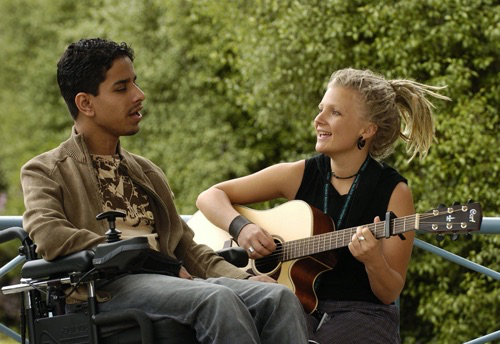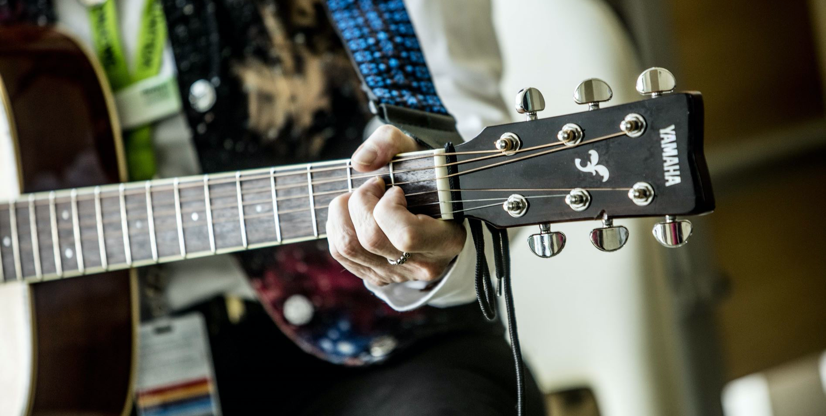Clinics & services
Music therapy
About music therapy
- Home
- Clinics & services
- Care & support
- Music therapy
- About music therapy
What happens in music therapy?
Music therapy can address physical, cognitive or communication goals. It also offers a non-verbal means for externalising and working through social and emotional issues that arise as a result of hospitalisation and adjustment to trauma.
Music therapy can help patients with:
- Physical and motor skills
- Communication (verbal and/or nonverbal)
- Cognitive retraining
- Relaxation
- Stimulation
- Pain management
- Emotional expression
- Social skills
- Motivation
- Independence
- Reality orientation
- PTA management
- Anxiety management
What techniques do we use?
We use the following music therapy techniques:
- Singing and voice exercises
- Playing instruments
- Music and relaxation
- Music-assisted counselling
- Movement to music
- Music listening and discussion
- Music and imagery
- Song sharing (music selection)
- Song writing
- Improvisation
- Composing
- Music facilitated life review
- Group or individual sessions

Music therapy in rehabilitation
We use music therapy to help patients to achieve, maintain or regaining optimum levels of functioning or adaptation in all areas of their rehabilitation.
We achieve this using a range of face-to-face services, resourcing, interdisciplinary work and collaboration with the rehabilitation team.
Emotional expression
Music therapy can facilitate emotional expression or release for patients who may be immobilised by anger, frustration and/or grief, particularly when cognitive or communication difficulties prevent verbal expression of these feelings. Patients may be able to express feelings nonverbally through singing, song writing, or playing instruments.
Song writing enables patients to express feelings associated with their changed lifestyle, role changes, grief and loss issues and can help to facilitate adjustment. Listening to songs may enable patients to understand their moods and gain some insight into their situation, enabling them to deal with their own issues more effectively. Songs can be used as a source of strength for those who struggle to reintegrate into the community.
Physical rehabilitation
Specific physical movement tasks involving instrument playing can be designed to target rehabilitation goals for strength, coordination and range of movement. These goals are addressed by focusing on rhythm, which is a fundamental requirement for movement co-ordination; the appropriate rhythmic structure of the music aids in the redevelopment of movement patterns.
Music can elicit unconscious physiological responses (eg. foot tapping) and is able to physically energize a patient to engage in physically demanding exercises for longer periods.
Cognitive rehabilitation
Percussion instrument tasks of varying levels of difficulty may be used in music therapy sessions to address cognitive issues such as attention, concentration, memory and initiation. Listening to songs can also be used to assess and address listening skills, recall of information, concentration and abstract thinking.
Songwriting may also be used to redevelop a patient’s skills at initiating and developing ideas. Alternately, music therapist may write songs with a patient who has memory difficulties as a strategy for encoding important information such as phone numbers or names of family and friends.
Communication rehabilitation
Therapeutic singing exercises can assist patients to develop muscle control and expand lung capacity. Singing familiar songs is a motivating way to practice articulation, phonation, voice projection and appropriate speech rates as well as redeveloping prosodic (the musical aspects of speech) features of conversation.
The rhythmic structure of music enables patients to organize their breathing and phonation through the rhythm of the music and again enables participation for longer periods before fatiguing. Articulation problems can be addressed through selection or composition of songs targeting specific consonants, sounds or words.
Melodic Intonation Therapy may be used to assist patients with language difficulties learn to speak again by singing melodic phrases that replicate natural speech patterns and intonation and gradually withdrawing these musical elements.
Related links
Find out more about how music therapy can help patients in many different ways.


